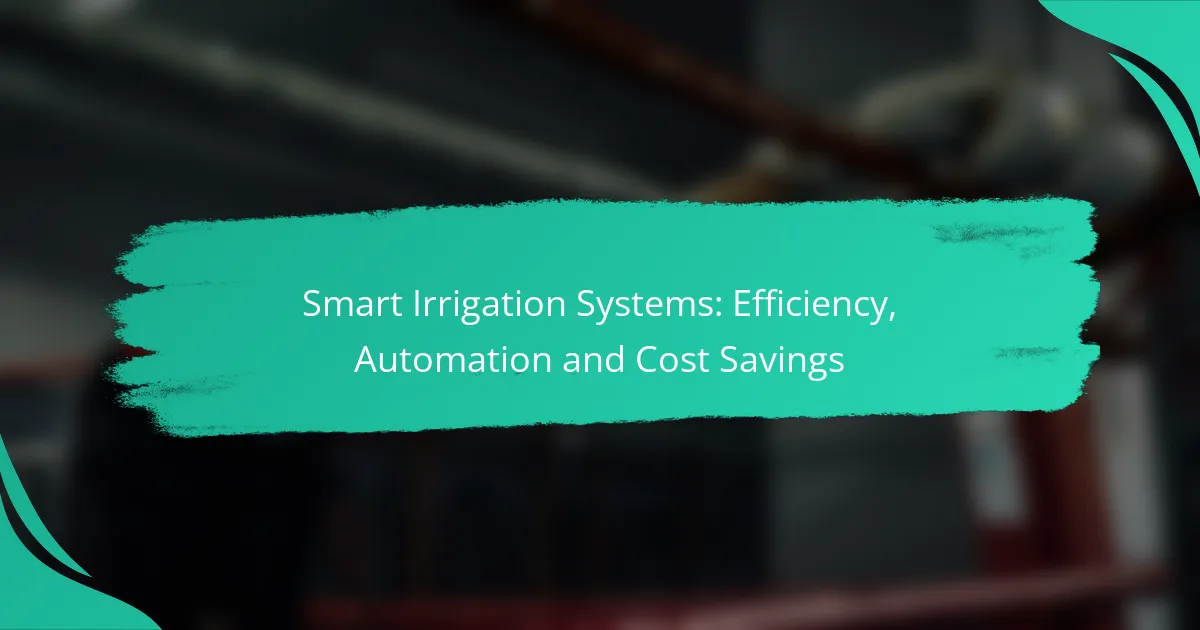Smart irrigation systems leverage advanced technology to optimize water usage, enhance efficiency, and reduce costs in agricultural and landscaping practices. By utilizing features such as soil moisture sensors and weather-based scheduling, these systems automatically adjust watering schedules, ensuring that plants receive the precise amount of water they need. This automation not only minimizes waste but also lowers labor and maintenance expenses, leading to significant long-term savings.
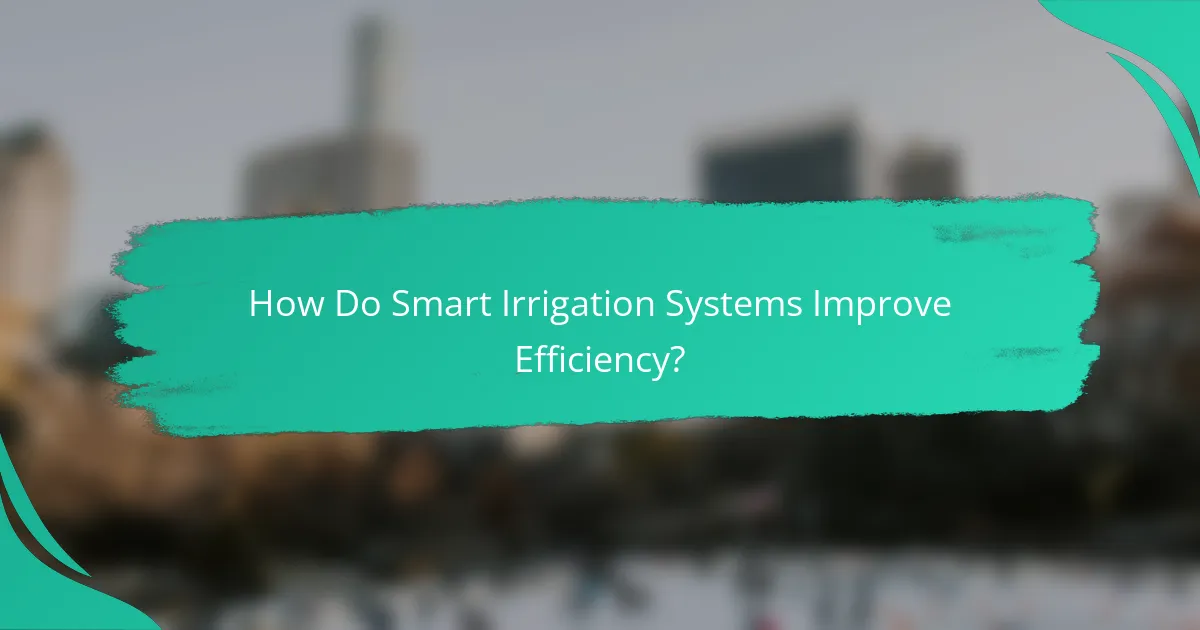
How Do Smart Irrigation Systems Improve Efficiency?
Smart irrigation systems enhance efficiency by utilizing technology to optimize water usage, reduce labor costs, and improve overall resource management. These systems automatically adjust watering schedules based on real-time data, ensuring plants receive the right amount of water at the right time.
Water conservation
Smart irrigation systems significantly conserve water by using sensors and weather data to determine the precise watering needs of plants. For instance, these systems can adjust irrigation schedules based on rainfall or soil moisture levels, reducing water waste by up to 50% compared to traditional methods.
Implementing drip irrigation or soaker hoses, which are often integrated into smart systems, delivers water directly to the plant roots, minimizing evaporation and runoff. This targeted approach not only conserves water but also promotes healthier plant growth.
Reduced labor costs
By automating the irrigation process, smart systems lower labor costs associated with manual watering. With remote management capabilities, users can control their irrigation systems via smartphone apps, eliminating the need for constant physical oversight.
Additionally, these systems can be programmed to operate during off-peak hours, further reducing labor and energy costs. This automation allows for more efficient use of staff time, enabling workers to focus on other essential tasks in landscaping or agriculture.
Optimized resource usage
Smart irrigation systems optimize resource usage by integrating various technologies, such as soil moisture sensors and weather forecasting. These tools help ensure that water, fertilizers, and other resources are applied only when necessary, preventing overuse and promoting sustainability.
For example, a smart system might analyze soil conditions and adjust fertilizer application rates accordingly, leading to better crop yields while minimizing environmental impact. This efficient resource management can lead to significant cost savings over time.
Data-driven decision making
Data-driven decision making is a key feature of smart irrigation systems, as they collect and analyze data on weather patterns, soil moisture, and plant health. This information allows users to make informed choices about irrigation schedules and resource allocation.
By leveraging historical data and predictive analytics, users can anticipate water needs and adjust their strategies accordingly. This proactive approach not only enhances efficiency but also contributes to long-term sustainability in agricultural practices.
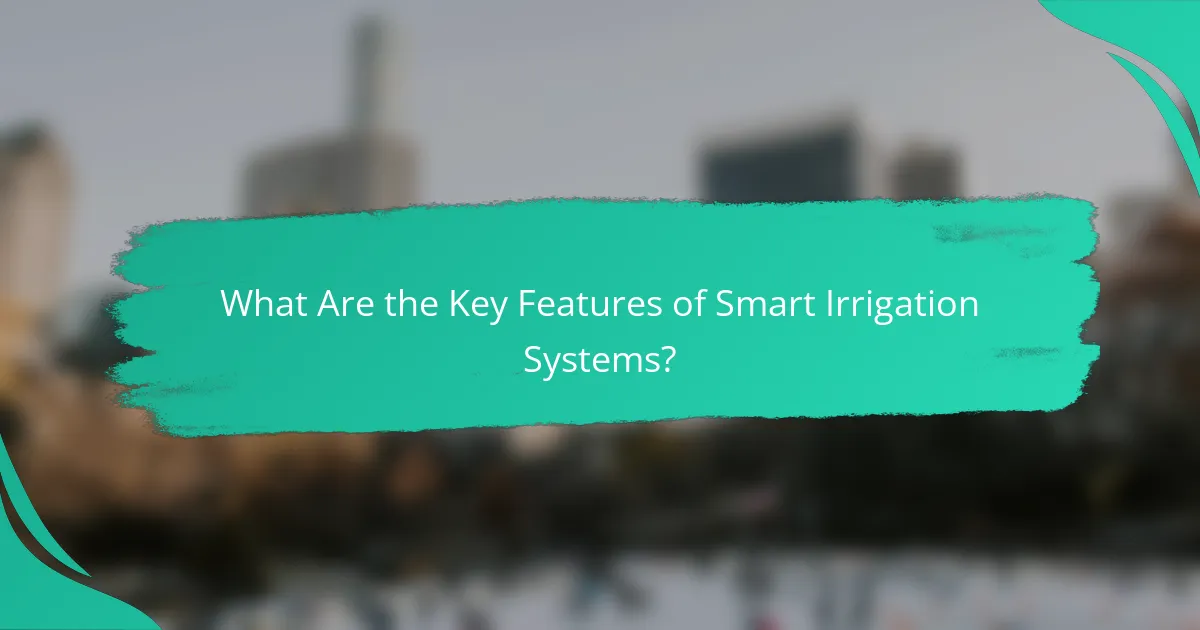
What Are the Key Features of Smart Irrigation Systems?
Smart irrigation systems are designed to optimize water usage through advanced technologies that automate and enhance irrigation practices. Key features include soil moisture sensors, weather-based scheduling, and remote monitoring capabilities, all aimed at improving efficiency and reducing costs.
Soil moisture sensors
Soil moisture sensors measure the water content in the soil, providing real-time data to the irrigation system. This allows for precise watering based on the actual needs of the plants, preventing over- or under-watering.
When selecting soil moisture sensors, consider factors like installation depth, sensor type (tension or volumetric), and compatibility with your irrigation system. Regular maintenance is essential to ensure accurate readings and optimal performance.
Weather-based scheduling
Weather-based scheduling utilizes local weather data to adjust irrigation schedules automatically. This feature helps to conserve water by accounting for rainfall and temperature fluctuations, ensuring that plants receive the right amount of water at the right time.
To implement weather-based scheduling effectively, integrate your irrigation system with local weather stations or use online weather services. This can lead to significant water savings, often reducing usage by 20-50% during dry periods.
Remote monitoring capabilities
Remote monitoring capabilities allow users to oversee and control their irrigation systems from anywhere using a smartphone or computer. This feature enhances convenience and enables quick adjustments based on changing conditions.
Look for systems that offer user-friendly interfaces and real-time alerts for issues like leaks or system failures. Regularly check your remote monitoring system to ensure it functions correctly and provides accurate data for informed decision-making.
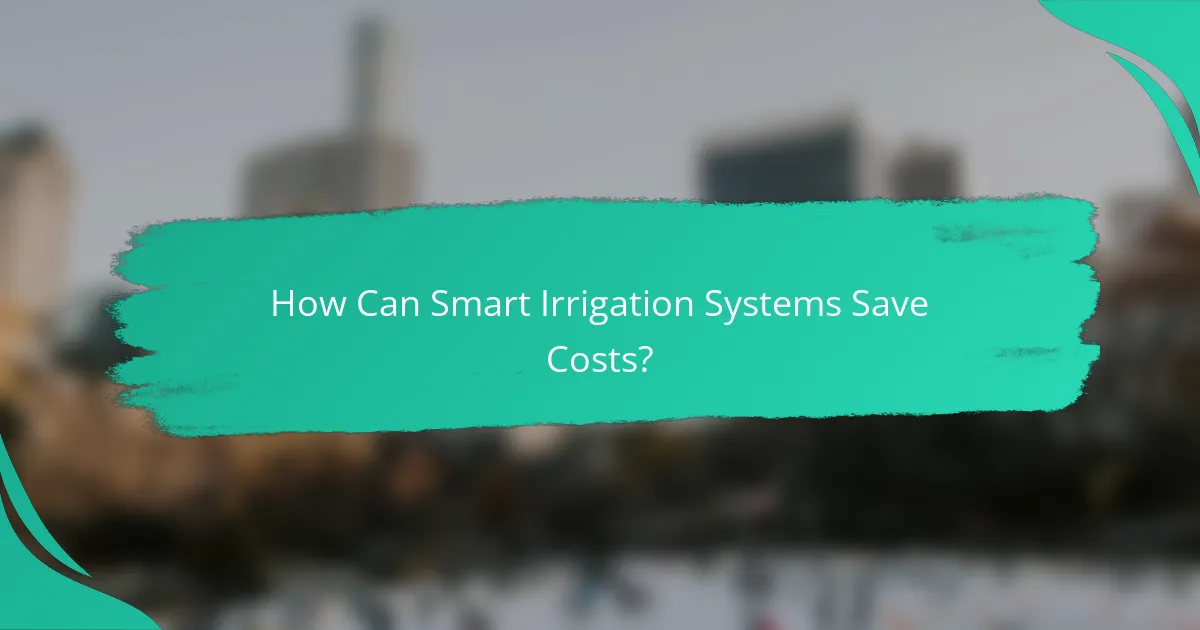
How Can Smart Irrigation Systems Save Costs?
Smart irrigation systems can significantly reduce costs by optimizing water usage, minimizing waste, and lowering maintenance needs. By employing advanced technology, these systems ensure that resources are used efficiently, leading to substantial savings over time.
Lower water bills
One of the most immediate benefits of smart irrigation systems is the reduction in water bills. These systems use sensors and weather data to determine the precise amount of water needed for plants, avoiding overwatering. Homeowners can often see reductions in their monthly water expenses by 20-50% compared to traditional irrigation methods.
Additionally, many municipalities offer rebates or incentives for installing water-efficient systems, which can further decrease upfront costs. Checking local regulations can provide opportunities for additional savings.
Reduced maintenance expenses
Smart irrigation systems require less maintenance than conventional systems, which can lead to lower overall maintenance costs. With automated features and self-diagnostics, these systems can alert users to issues before they escalate, reducing repair costs. Regular maintenance can often be cut by 30-40%.
Moreover, the durability of modern smart irrigation components means fewer replacements are needed over time. Investing in quality equipment can lead to long-term savings on repairs and replacements.
Long-term investment returns
Investing in a smart irrigation system can yield significant long-term returns. While the initial investment may be higher than traditional systems, the savings on water bills and maintenance can pay off within a few years. Many users report a return on investment (ROI) within 3-5 years.
Furthermore, properties equipped with smart irrigation systems can have higher market values, as water efficiency is increasingly attractive to buyers. This added value can make the investment worthwhile in the long run.
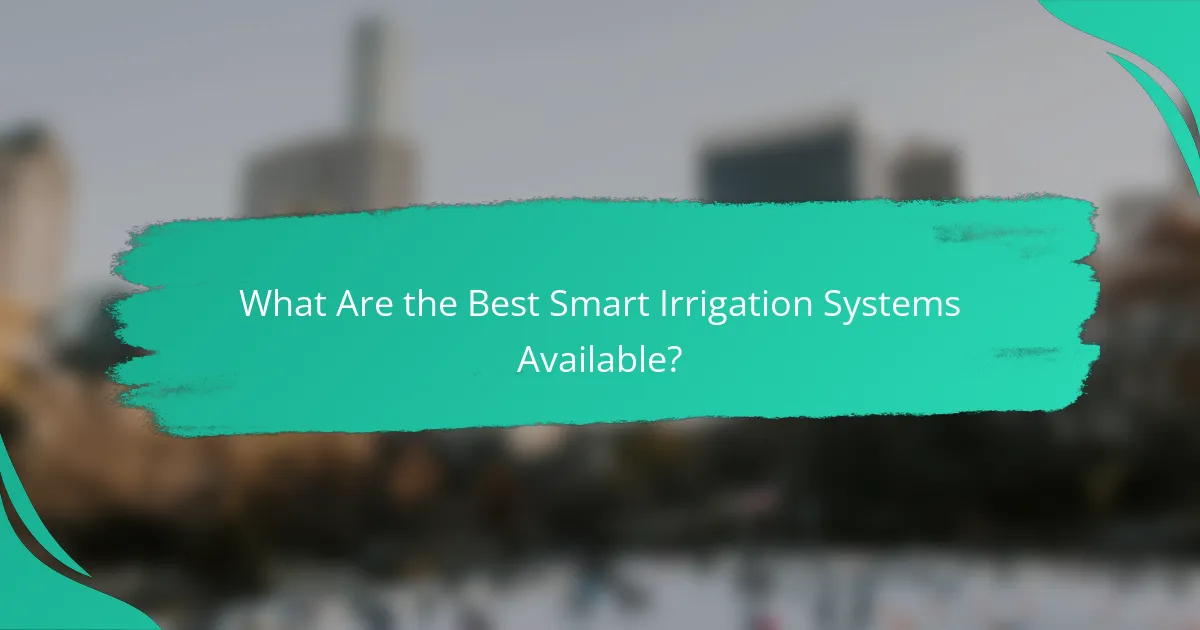
What Are the Best Smart Irrigation Systems Available?
The best smart irrigation systems combine efficiency, automation, and cost savings to optimize water usage for gardens and lawns. These systems utilize advanced technology to monitor weather conditions and soil moisture, ensuring that plants receive the right amount of water at the right time.
Rachio Smart Sprinkler Controller
The Rachio Smart Sprinkler Controller is known for its user-friendly app and robust features. It connects to Wi-Fi and allows users to control their irrigation system remotely, adjusting schedules based on real-time weather data.
Key considerations include its compatibility with various sprinkler systems and the ability to create customized watering schedules. Users can save up to 50% on water usage compared to traditional systems, making it a cost-effective choice.
RainMachine Touch HD
The RainMachine Touch HD stands out with its high-definition touch screen and intuitive interface. This system offers local weather data integration, which helps in making precise watering decisions based on current conditions.
It supports multiple zones and allows for manual adjustments. Users appreciate its ability to save water while maintaining healthy landscapes, often reporting savings of around 30% on their water bills.
Orbit B-hyve Smart Sprinkler
The Orbit B-hyve Smart Sprinkler is designed for easy installation and operation. It features a mobile app that provides weather-based watering adjustments, ensuring optimal irrigation without waste.
This system is particularly budget-friendly, making it accessible for homeowners looking to upgrade their irrigation. Users can expect significant reductions in water usage, often achieving savings of 20-40% compared to conventional systems.
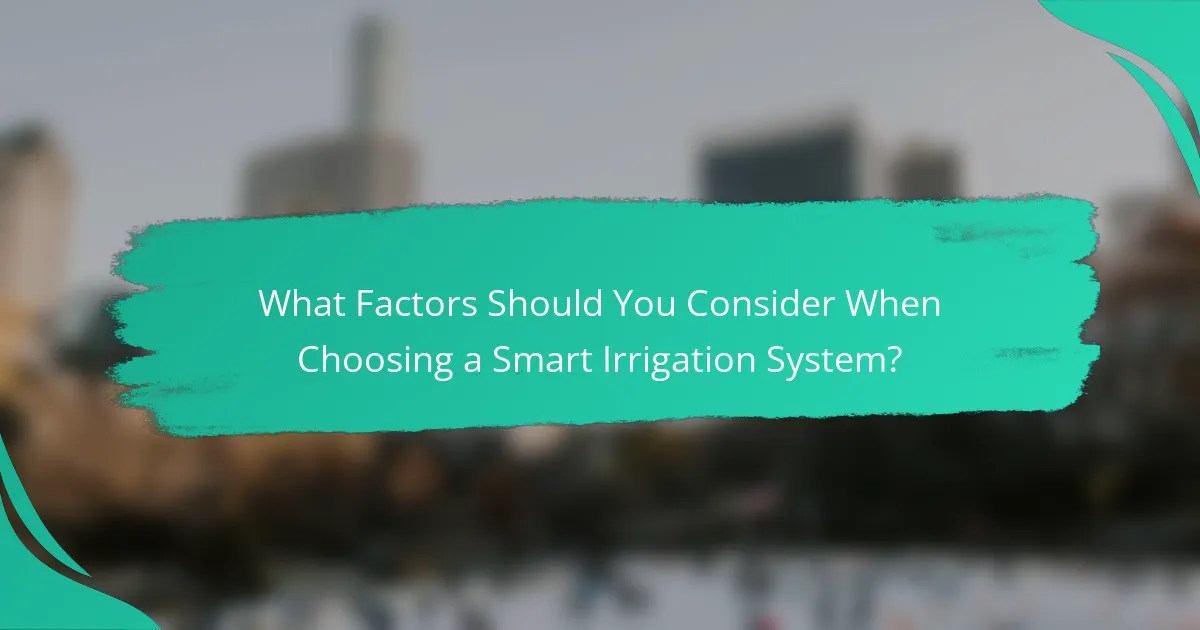
What Factors Should You Consider When Choosing a Smart Irrigation System?
When selecting a smart irrigation system, consider compatibility with existing infrastructure, scalability for future needs, and installation requirements. These factors will help ensure that the system meets your specific landscape and budgetary needs effectively.
System compatibility
System compatibility refers to how well a smart irrigation system integrates with your current watering setup and landscape features. Check if the system can work with existing pipes, valves, and controllers to avoid costly upgrades.
Additionally, consider whether the system supports various sensors and weather data inputs. A system that can connect with local weather stations or soil moisture sensors can optimize water usage significantly.
Scalability options
Scalability options determine how easily a smart irrigation system can expand to accommodate additional zones or features. If you plan to grow your garden or landscape, choose a system that allows for easy addition of new components without major overhauls.
Look for systems that offer modular designs or cloud-based management, which can simplify upgrades and expansions. This flexibility can save you costs in the long run as your irrigation needs evolve.
Installation requirements
Installation requirements vary among smart irrigation systems, affecting both time and cost. Some systems are designed for DIY installation, while others may require professional help, particularly if extensive plumbing work is needed.
Before purchasing, review the installation guidelines and consider any local regulations regarding irrigation systems. Understanding these requirements can help you avoid unexpected delays and expenses during setup.
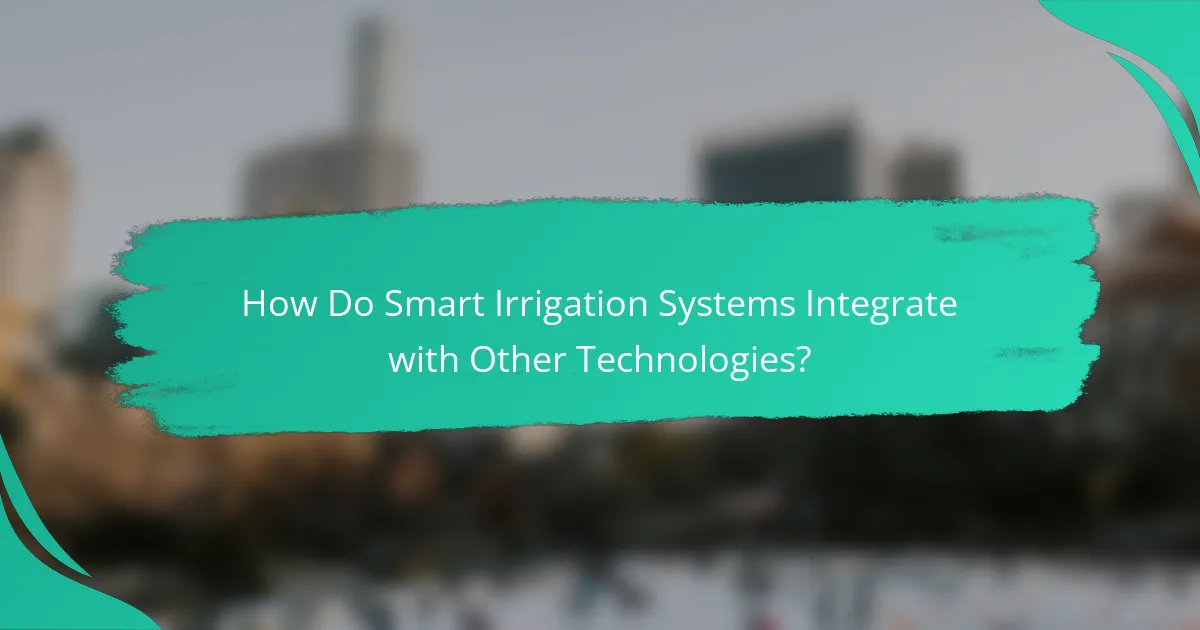
How Do Smart Irrigation Systems Integrate with Other Technologies?
Smart irrigation systems integrate with various technologies to enhance efficiency and automation. By connecting with home automation systems and weather APIs, these systems optimize water usage based on real-time data and user preferences.
Integration with home automation systems
Smart irrigation systems can seamlessly connect with home automation platforms, allowing users to control their irrigation schedules through a central hub. This integration enables homeowners to manage their watering needs remotely using smartphones or voice commands.
For example, a smart irrigation system can be programmed to adjust watering times based on household activity, ensuring that water is not wasted when residents are away. Users should consider compatibility with existing home automation devices to maximize functionality.
Compatibility with weather APIs
Weather APIs provide real-time weather data that smart irrigation systems can use to make informed decisions about watering schedules. By accessing forecasts and current conditions, these systems can reduce water usage during rain or adjust for high temperatures.
For instance, if a weather API predicts rain within the next few days, the irrigation system can delay scheduled watering, conserving water and reducing costs. Homeowners should ensure their smart irrigation system is compatible with reliable weather services to fully benefit from this feature.
